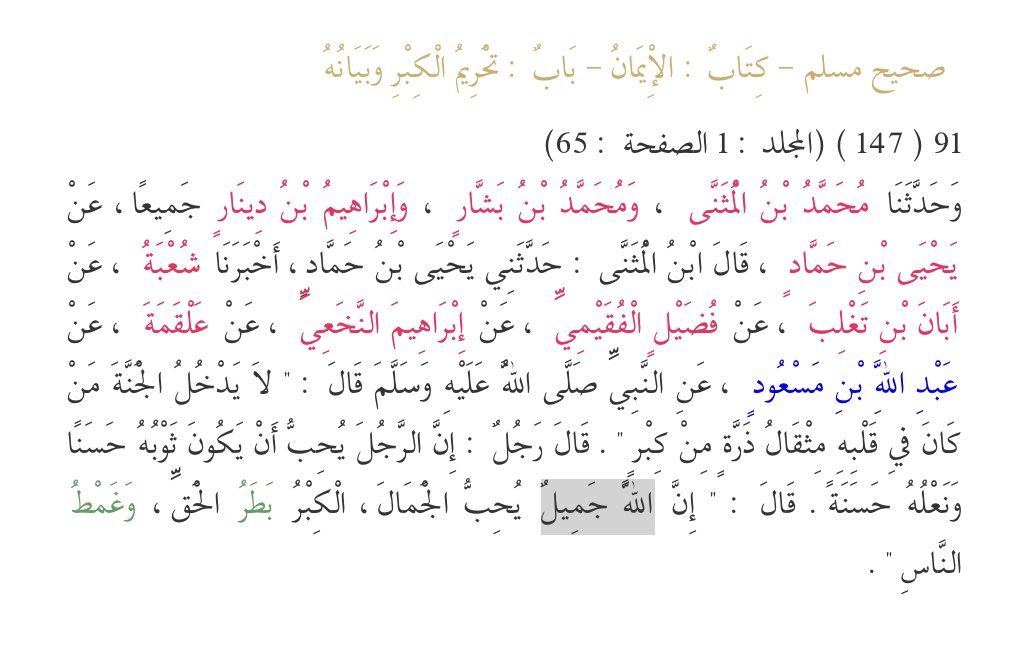
﷽
Prophetic Character With One’s Wife
As ridiculous assertions continue to be made about Rasūlullāh ﷺ, the one of الخلق العظيم, I’m compelled to say that the correction below is incomplete and has not highlighted the most important points regarding the narration at hand….
Prophetic Character With One’s Wife
As ridiculous assertions continue to be made about Rasūlullāh ﷺ, the one of الخلق العظيم, I’m compelled to say that the correction below is incomplete and has not highlighted the most important points regarding the narration at hand….
https://twitter.com/salyounas/status/1625919250425577476
1 The *issue* over which Rasūlullāh ﷺ is “disciplining” Lady ‘Aisha is insistence upon his *love and loyalty* to her when she doubted. In simple terms, he is putting her heart at rest. Does that context have any parallel whatsoever with aggressive assertion of spousal authority?
2 By the explanation of Sh. Gibril, that the ‘gentle correction’ is means of removing waswas & conferring blessings, this report is clearly informing of a PROPHET-SPECIFIC action (khāsiyyah), which is not legislated for others. Who dares claim that their striking has such effect?
3 The ONLY instance in which the Quran permits “gentle physical intervention” is nushūz.
It’s conditions & limits are detailed in the sacred law so as to NOT permit such instances to be left to the whims of a husband who dares enstate his ego as judge & jury over his wife.
It’s conditions & limits are detailed in the sacred law so as to NOT permit such instances to be left to the whims of a husband who dares enstate his ego as judge & jury over his wife.
4 As I’ve detailed in my article below*, ambiguous reports are to be understood in light of clear ones. In this case, an exceptional action of his ﷺ seemingly contradicts both the Quran & his general behavior. Rasūlullāh ﷺ never raised his hand on anyone except in battle. Fact. 



5 Early Islamic Arabian culture is completely different than today. The highly human idiosyncrasies of intimate relationships is not an immutable aspect of Religion!
It’s entirely valid for (healthy) social factors to dictate what is (or is not) decent conduct with one’s wife.
It’s entirely valid for (healthy) social factors to dictate what is (or is not) decent conduct with one’s wife.
6 What a despicably hideous act it is to perceive the magnificently beautiful character of Rasūlullāh ﷺ through the ego of ignoramouses. The most “stern” of his blessed actions ﷺ is gentler than the vain “kindness” of one with no fear of God in his heart, no mercy toward others
7 Any man or woman who speaks about Rasūlullāh ﷺ without knowledge will bear a severe burden on Judgement Day, of their own sin and of all the women they may have turned away from the Sunnah and the men whom they encouraged to harm their spouses.
8 This is what happens when we view Religion outside of a fitra-based conception. We’ve literally lost all semblance of ‘religious common sense’. Things that used to be so basic & fundamental to Religion are becoming whispers, while the most vile and ignorant voices are heard.
9 What’s even more deplorable than the comments of OP, is the ‘silent support’ that exists among some ‘traditional’ scholars for such attitudes. It’s particularly prevalent among South Asians and propogated by some of their scholars. The madhhab of Abu Hanīfa is innocent of them.
10 Yet, anti-feminist warriors (sorely lacking in prophetic tarbiya) are the ‘champions’ of Muslim women? Do you see a problem here? We want Muslim women to be bold and brazen against feminists, but - in our own circles - we don’t even respect our own wives and female scholars?
11 You don’t need to be a scholar to see hypocrisy.
You DO need to be a decent human being to be a follower of Rasūlullāh ﷺ.
The essence of Religion is PROPHETIC ETHICS.
Any religious interpretation that views the Sunnah outside that context is a fabrication of the ego.
You DO need to be a decent human being to be a follower of Rasūlullāh ﷺ.
The essence of Religion is PROPHETIC ETHICS.
Any religious interpretation that views the Sunnah outside that context is a fabrication of the ego.

12 Who defines prophetic ethics? If we vehemently reject the impositions of the misogynistic mind upon the Sunnah, how is that any different than those who allegedly claim to defend it without drawing upon the knowledge of true prophetic inheritors? It goes both ways. Seek truth.
13 Religion is not subject to whim. It is Revelation.
This is why the ‘sanad of spirituality’ is so important in Religion.
The ‘outward chain of hadīth’ is not sufficient to understand Religion, as the OP has blatantly illustrated.
This is why the ‘sanad of spirituality’ is so important in Religion.
The ‘outward chain of hadīth’ is not sufficient to understand Religion, as the OP has blatantly illustrated.
14 What is the solution?
The solution is PROPHETIC TARBIYA of both men and women, outwardly and inwardly.
The solution is a scholarly culture of integrity and upholding traditional standards of erudition.
The solution is respect for both male and female scholarship.
The solution is PROPHETIC TARBIYA of both men and women, outwardly and inwardly.
The solution is a scholarly culture of integrity and upholding traditional standards of erudition.
The solution is respect for both male and female scholarship.
15 This is why we @fitrafoundation are determined to revive the true transmission of prophetic ethics through the integration of both the letter and spirit of the sacred law.
#metafiqh
“Read the Sunnah with your heart. Defend it with your mind.”
fitrafoundation.org/wp-content/upl…
#metafiqh
“Read the Sunnah with your heart. Defend it with your mind.”
fitrafoundation.org/wp-content/upl…
اللهم اصلح وارحم وفرج عن أمة سيدنا محمد
اللهم بارك لنا في رجب وشعبان وبلغنا رمضان
اللهم صل على سيدنا محمد نورِ الأنوار وسر الأسرار وترياق الأغيار ومفتاح باب اليسار ،سيدنا محمد المختار ،وآله الأطهار وأصحابه الأخيار عدد نعم الله و افضاله
الحمد لله ربّ العالمين
اللهم بارك لنا في رجب وشعبان وبلغنا رمضان
اللهم صل على سيدنا محمد نورِ الأنوار وسر الأسرار وترياق الأغيار ومفتاح باب اليسار ،سيدنا محمد المختار ،وآله الأطهار وأصحابه الأخيار عدد نعم الله و افضاله
الحمد لله ربّ العالمين
To remove any confusion, I’d like to state that I have great respect for Sh. Gibril & his scholarship. In fact, he was among the first I studied hadīth with. The placing of his article here was called for but definitely not fully clear to non-experts, who are the target audience.
May Allah’s infinite peace & blessings be upon Rasūlullāh, his pure progeny & folk, along with his gleaming companions, illuminated inheritors, and all loyal followers until the Last Day.
• • •
Missing some Tweet in this thread? You can try to
force a refresh









